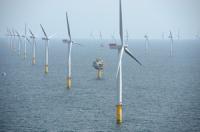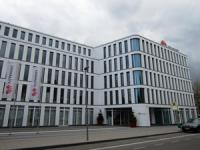-
Supporting global companies against cyber threats
A consortium of U.K. cyber security experts is to support global businesses to tackle online threats and protect themselves from cybercrime. The Cyber Readiness for Boards project has been launched to explore the factors shaping U.K. board decisions around cyber risk and develop interventions to provide guidance and support.
-
-
Bigger than Huawei: U.S. broadens scrutiny of Chinese technology
A flurry of seemingly disconnected actions by the U.S. government to curb the involvement of Chinese technology firms in the U.S. economy over the past year reflects the Trump administration’s intensifying concern that those firms could — now or in the future — abet espionage by Beijing’s intelligence services.
-
-
British oversight body: Security flaws in Huawei 5G networks
A British oversight board has slammed the Chinese telecom giant Huawei for software security flaws. The report, however, stopped short of blaming Chinese intelligence agencies for the engineering defects. The United States is concerned that Huawei is a front for the Chinese intelligence services, and that rolling out Huawei’s 5G system in Europe would open the door for Chinese spying or sabotage.
-
-
Israel’s Carbyne, RapidSOS partner to improve 911 calls
Dialing 911 in an emergency is something that we’ve all been instructed to do since childhood. And old-fashioned, simple dialing is what most of us are still doing, even in an age of far more sophisticated technology. Next-gen public safety tech company will provide call takers with more informative real-time data to help first responders locate and treat callers.
-
-
Dunford: Google’s work with China “challenges” U.S. military advantage

The top U.S. military officer has called out U.S. technology giant Google for its artificial intelligence venture in China, saying it “creates a challenge” in maintaining a U.S. military advantage over the Chinese.
-
-
Offshore wind energy potential not exploited by U.S. energy companies

When it comes to wind energy, the United States is sitting on a gold mine, so to speak. It’s a moment of untapped potential that, if harnessed properly, could transform the way the U.S. uses energy, one expert says.
-
-
Mega European project on cybersecurity and data protection
A new European Commission cyber project aims to set international standards in cybersecurity and boost the effectiveness of Europe’s security capacities.
-
-
Cyber toolkit for criminal investigations
cybercrimes reached a six-year high in 2017, when more than 300,000 people in the United States fell victim to such crimes. Losses topped $1.2 billion. Cybercriminals can run, but they cannot hide from their digital fingerprints.
-
-
Dark web marketplace for SSL and TLS certificates

A thriving marketplace for SSL and TLS certificates—small data files used to facilitate confidential communication between organizations’ servers and their clients’ computers—exists on a hidden part of the internet.
-
-
Blocking digital gold diggers

It is a phenomenon known to almost all of us: you browse the web and suddenly your computer slows down and runs loudly. This could be due to so-called crypto mining, meaning the access to computer power to generate cryptocurrencies without the knowledge of the user. New software, called “CoinEater,” blocks crypto mining.
-
-
U.S. to Germany: Huawei deal could harm intelligence sharing

The United States on Monday warned Germany about future “information sharing” if it uses “untrusted vendors” in its 5G telecom infrastructure amid debate over whether Chinese IT giant Huawei is an espionage risk.
-
-
Immigration is beneficial to local economies, even after 100 years
An important issue in current American political discourse is the effect that immigrants have on the communities in which they settle. While this topic has received significant attention, the focus has generally been on the short-term effects of immigrants. A new study finds that U.S. counties with more historical immigration have higher incomes, less poverty, and lower unemployment today.
-
-
China's Huawei sues U.S. government over ban

Chinese tech giant Huawei has sued the U.S. government, arguing that legislation Congress passed last year that restricts its business in the United States is “unconstitutional.” The case, which analysts see more as a public relations move, is but the latest in an intensifying effort by the telecommunications company to fight U.S. security concerns, which Huawei argues are unfair and unfounded.
-
-
Canada must not be naive when dealing with China’s authoritarian regime

A new book on Canada-China relations offers lessons for the United States. The book “is in many ways a primer on the central challenge of our era – the question of how democracies address the scope and depth of an authoritarian wave now picking up momentum,” writes Hugh Segal, a Canadian foreign policy expert. “Our engagement with China must set aside the temptations of presuming fair minded universal intent on the part of Chinese state-controlled instruments, economic, diplomatic or military. We must be more focused on the protection of our own security and freedoms from Chinese subversion. Countries that wish access to our resources, technology and investment on normative terms do not get to launch cyberattacks against us, from military and intelligence units controlled by the state.”
-
-
Emission regulatory rollback: 200M metric tons of additional green house gasses annually
Following the release of the Fourth National Climate Assessment, the Trump administration is proposing to give four top climate-polluting industries a pass. A new report says that six specific regulatory rollbacks will cause an annual increase of more than 200 million metric tons of carbon dioxide equivalent, resulting in the loss of hundreds of billions of dollars in forgone benefits, and lead to tens of thousands of premature deaths.
-
More headlines
The long view
Factories First: Winning the Drone War Before It Starts
Wars are won by factories before they are won on the battlefield,Martin C. Feldmann writes, noting that the United States lacks the manufacturing depth for the coming drone age. Rectifying this situation “will take far more than procurement tweaks,” Feldmann writes. “It demands a national-level, wartime-scale industrial mobilization.”
Trump Is Fast-Tracking New Coal Mines — Even When They Don’t Make Economic Sense
In Appalachian Tennessee, mines shut down and couldn’t pay their debts. Now a new one is opening under the guise of an “energy emergency.”
Smaller Nuclear Reactors Spark Renewed Interest in a Once-Shunned Energy Source
In the past two years, half the states have taken action to promote nuclear power, from creating nuclear task forces to integrating nuclear into long-term energy plans.
